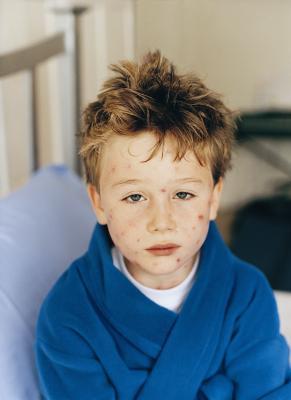Measles, mumps and chicken pox were once common illnesses of childhood that have mostly been brought under control by vaccinations. All three diseases are very contagious. If your child is not vaccinated, he can get one of the diseases through contact with another infected child. Each disease can have serious complications, so prevention is the key to keeping your child safe and healthy.
Measles Symptoms
When a child has measles, his body is usually covered in a large, blotchy rash. The rash generally first appears on the child’s forehead, then moves down to cover the rest of his body, according to KidsHealth. A child with measles will also have tiny spots, called Koplik’s spots, inside his mouth. Before the rash appears, the child will have flu- or cold-like symptoms, including a runny nose, cough and fever. His eyes may be red from conjunctivitis.
Chicken Pox Symptoms
Chicken pox are also characterized by a rash. The chicken pox rash differs from the measles rash in that it consists of red, itchy bumps that first appear on a child’s torso. As the disease runs its course, the bumps burst, then scab over. A child with chicken pox may also have a fever, stomach pain and a headache a few days before the rash appears.
Mumps Symptoms
A child with mumps often has swollen salivary glands on one or both sides of her face. The glands may be so swollen that it looks like the child has food stuffed into her cheeks. It may be painful for the child to talk or swallow when her glands are swollen. Some children may also have a high fever and headache. It may take several weeks for the symptoms for appear after a child contracts the virus. About 20 percent of children with mumps may never have any symptoms, according to MayoClinic.com.
Complications and Risks
Measles, mumps and chicken pox all have potentially serious complications. A child with measles can also develop an ear infection or pneumonia, according to MayoClinic.com. Mumps can also lead to meningitis or inflammation of the testicles or ovaries. Though chicken pox is usually mild, older children, teenagers and adults can experience complications, such as a bacterial skin infection. People who have chicken pox as a child may develop shingles as adults. All three diseases can also lead to encephalitis, or swelling of the brain, although this is rare.
Prevention/Solution
Fortunately, a vaccine exists for all three illnesses. Both the measles and mumps vaccines have been available in the United States since the 1960s and have prevented millions of cases of both diseases. Children in the United States generally receive vaccination for measles and mumps as toddlers and then again before they begin kindergarten, according to MayoClinic.com. The chicken pox vaccine has been available since the mid-1990s. Vaccination prevents about 90 percent of chicken pox cases, according to the MayoClinic.com. Children should get it as toddlers and before they start school. Teenagers and adults who have not had the disease should also get vaccinated.





